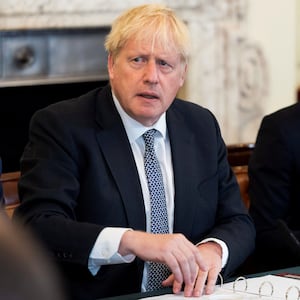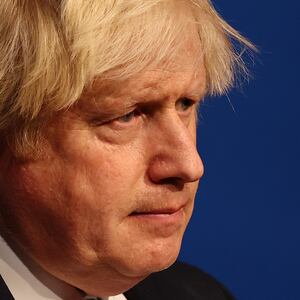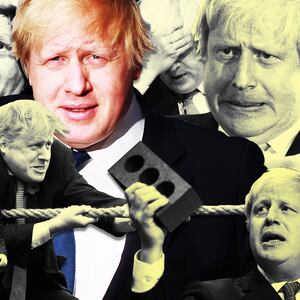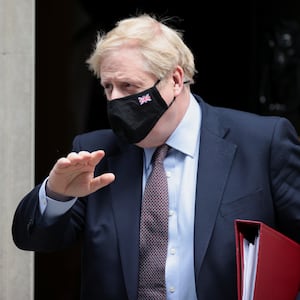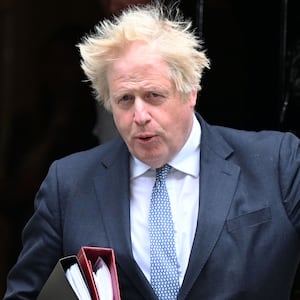Boris Johnson spent most of his life dreaming of becoming Britain’s prime minister after humbly downscaling his childhood ambition of being “world king.” Less than three years after he achieved his goal, he’s been bundled out of office in arguably the most humiliating circumstances of any PM in 300 years.
He was savaged by his own ministers who dramatically quit his government in a record-breaking tsunami of disgust.
Johnson likes to think of himself as a British history buff. Obsessed with Winston Churchill, he had perhaps fantasized about leading a country through a generation-defining crisis more often than anyone. He may have thought his call of duty was to see through the Brexit project—one which he officially completed in 2020 but that mess continues to unravel. His handling of the COVID crisis will forever be overshadowed by his attempts to cover up a string of parties held inside Downing Street while the rest of the country was locked down.
Johnson will announce his resignation Friday, but he will hope to limp on as PM until a replacement is chosen by the Conservative Party in October.
He will go down in history as one of Britain’s worst prime ministers, with a record-eviscerating 55 ministerial resignations from his government in 48 hours.
The 58-year-old became one of Britain’s most high-profile politicians long before he held any real power. His controversial journalism career, followed by his appearances on television panel game shows during his early years in politics, saw him become a household name. Johnson’s bumbling, clownish persona and ramshackle appearance made it easy for him to stick out from the dusty gray relics who sat next to him on the benches of Parliament.
But it was always just a persona. Alexander Boris de Pfeffel Johnson, born in New York in 1964, was bred for power and ruthlessly clung to it until the day that he was finally forced out. His great-grandfather Ali Kemal was an interior minister in the Ottoman Empire. His father, Stanley, was a diplomat and member of the European Parliament. Johnson was educated at Eton College—the illustrious school that’s pumped out 20 prime ministers over the centuries.
He went from Eton to study at Oxford University, where, already highly skilled in the art of making people pay attention to him, he was voted in as president of the Union. Soon after graduating, in 1987, he arrived on the national stage as a young journalist—but not for the right reasons. He was very publicly fired from The Times of London within months of starting for completely making up a quote on his very first front-page story. It was the first, but certainly not the last time Johnson brazenly attempted to mislead the British public.
Had he been less determined—or not as well-connected—that could well have been the end of his career. As it happened, after a brief penance at some local newspapers, he joined the conservative Daily Telegraph as its Brussels correspondent, where he virtually invented the brand of brash “Euroscepticism” that he would use decades later to persuade voters to leave the European Union. Far from being a fatal weakness, his ability to stretch the truth and then package it into a memorable turn of phrase became the very basis of his success.
From there, on the strength of his outwardly affable persona and increasing notoriety in journalism, he stood for and was elected to Parliament in 2001. He stayed for seven years until, in 2008, he spotted an even better opportunity to increase his public profile. He was elected mayor of London and was re-elected again in 2012. During his time, he was able to showcase his ability to deal with a crisis when a series of violent riots erupted in the city in 2011, and he triumphantly oversaw the successful 2012 Summer Olympics a year later.
His time in London’s City Hall was seen as a success, although his former colleagues later told The Daily Beast that was largely in spite of Johnson, who they described as an incredibly lazy man who doesn’t care about detail and would frequently just make things up.
Nevertheless, in 2015, Johnson announced that he wanted to return to Parliament and, now that he was armed with some leadership experience, it was clear to everyone that he was there to fulfill his long-held dream of becoming prime minister. The incumbent leader, David Cameron, had been Johnson’s rival for decades. They attended Eton and Oxford together, and Johnson seethed as the slightly younger Cameron rose above the wannabe-world-king in power. In 2016, ahead of the Brexit referendum, the schoolboy rivalry erupted into public view.
Johnson’s decision to join and then lead the campaign for Britain to leave the EU—against the prime minister’s campaign to remain—was not a matter of principle but a calculated gamble to enhance his chances of power. He knew that, even if he lost, it would only be after a lot of invaluable TV news coverage that showed him as a leader. Famously, Johnson wrote two columns on the weekend he announced his decision. One put forward his case to remain, and the other put forward his case to leave. He decided to publish the Leave column.
The gamble paid off. The Leave campaign won a shock victory and Johnson became the public face of a campaign that clearly resonated with a slim majority of voters in Britain. It wasn’t an ethical or truthful campaign—its central message was to take back control of a mythical £350 million that Johnson falsely claimed the U.K. sent to the EU every week. It also published misleading dog-whistle warnings about 76 million people from Muslim-majority Turkey flooding into Britain through the EU.
But Johnson won, Cameron resigned, and only a separate rivalry with his fellow Leave campaigner Michael Gove—who stood for leader alongside Johnson to divide the vote and stop him from winning—prevented Johnson from becoming PM three years before his eventual rise to the top job.
The winner of that leadership contest, Theresa May, appointed him as foreign secretary—Britain’s most senior diplomat. Having just fallen short of becoming prime minister, Johnson seemed uninterested in the role and his time was predictably marred by a series of high-profile errors. One of his junior ministers later recalled that clearing Johnson’s mistakes was a “full-time activity” and said he became known in other countries as Johnson’s “pooper scooper” because he was forced to clear up his mess so many times.
Johnson quit as foreign secretary in July 2018, claiming in his resignation letter that the U.K. was headed “for the status of a colony” if May’s Brexit plans were adopted—plans that were largely similar to the ones he would eventually use to leave the EU in 2020. Nevertheless, his resignation freed him from the restrictions of government and allowed him to wait for May to fail—or, rather, act as a quiet catalyst for that outcome in the background—so he could step in and save the day when the Brexit project faltered.
That day finally came in 2019, when May’s Brexit deal was repeatedly rejected by Parliament and she resigned. He stood and was voted in as Conservative leader and, as leader of the largest party, he was also automatically installed as prime minister. Soon afterward, he called a general election in December 2019 and his blunt message to “get Brexit done” was endorsed by voters who gave him a landslide victory. He led Britain out of the EU in January 2020.
Having already achieved his central campaign promise a month into his new government, Johnson was set to start work on creating the rest of his legacy when reports about a new virus started seeping out of China.
Johnson’s initial response was—in fitting with the rest of his career—light-hearted and controversial. Earlier in March, as other countries were deploying powerful counter pandemic measures, Johnson paid a visit to a hospital that was treating virus patients and later boasted to reporters that he shook everyone’s hand there. Britain also initially pursued a policy of allowing the disease to spread, relatively untested and unchecked, in an apparent departure from the approaches taken across the rest of the world.
However, the policy changed when a bombshell report on the likely catastrophic impact of coronavirus stiffened policy in London. Johnson switched from being relatively flippant about the disease to taking on a starker tone with the public. He settled into the role of quasi-wartime prime minister until April of that year, when he nearly died from the virus, but then he recovered to lead the nation through the pandemic for the rest of 2020 and 2021.
Up until much more recently, it didn’t seem as if Johnson had a terrible pandemic. Cases and death rates were, broadly speaking, in line with similarly sized European nations, and Britain had one of the fastest and most successful vaccine rollouts on the planet. That was followed up by a similarly rapid booster rollout as the Omicron variant threatened to disrupt Christmas last December.
But people didn’t know until late last year that, while they were living in solitude and mourning loved ones in 2020 and 2021, Johnson was partying. A deluge of reports exposed the high jinks that were going on in 10 Downing Street while the rest of Britain was living through one of its grimmest national moments. They included a boozy party the night before Queen Elizabeth II sat distanced from her family at Prince Philip’s funeral, as well as a surprise birthday bash for Johnson in June 2020 where people enjoyed cake and finger foods.
As more and more lockdown-busting parties were exposed, many of Johnson’s supporters in his Conservative Party abandoned him, and those who didn’t found it increasingly difficult to publicly defend his ridiculous actions. One of his lawmakers, asked why the prime minister thought it was a good idea to attend a birthday party while the rest of the nation was strictly locked down, claimed with a straight face that Johnson was “ambushed by a cake.”
Johnson managed to survive the immediate fallout from Partygate, but his authority was fatally undermined.
Ministers who were sent out to lie for the prime minister over the parties refused to do so again when a new scandal hit No. 10 this week. It wasn’t the revelation that Johnson had employed a man with a history of sexual-harassment allegations to his name that forced a revolt from within his own ranks; it was the ever-changing set of excuses that did for him. They evolved each day, once the previous position had been exposed as another lie.
Sajid Javid, the health secretary, was the first to quit, and he explained to the House of Commons on Wednesday that he had been stung by previous untruths peddled by Johnson’s team. He said assurances were given to him personally by No. 10 that there was no truth to the party allegations before he did media interviews defending the PM. Those assurances turned out to be lies.
Javid said he had given Downing Street the benefit of the doubt on that occasion but would not be making the same mistake this time. “And now this week again, we have reason to question the truth and integrity of what we’ve all been told. And at some point, we have to conclude that enough is enough,” he said.
Too many lawmakers in Johnson’s party were no longer willing to tarnish their own reputations by defending the indefensible.
Johnson arrived in office hoping to emulate his hero Winston Churchill, and he was even handed an unprecedented global crisis to test his mettle. He failed to rise to the challenge and leaves his office as a disgraced liar and a punchline. For anyone who watched him bullshit his way to power, the only surprise is that, this time, it actually had consequences.


